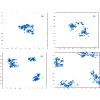当前位置:
X-MOL 学术
›
Phys. Rev. E
›
论文详情
Our official English website, www.x-mol.net, welcomes your feedback! (Note: you will need to create a separate account there.)
Evolutionary dynamics from deterministic microscopic ecological processes
Physical Review E ( IF 2.4 ) Pub Date : 2020-03-17 , DOI: 10.1103/physreve.101.032411 Vaibhav Madhok
Physical Review E ( IF 2.4 ) Pub Date : 2020-03-17 , DOI: 10.1103/physreve.101.032411 Vaibhav Madhok

|
The central goal of a dynamical theory of evolution is to abstract the mean evolutionary trajectory in the trait space by considering ecological processes at the level of the individual. In this work we develop such a theory for a class of deterministic individual-based models describing individual births and deaths, which captures the essential features of standard stochastic individual-based models and becomes identical to the latter under maximal competition. The key motivation is to derive the canonical equation of adaptive dynamics from this microscopic ecological model, which can be regarded as a paradigm to study evolution in a simple way and give it an intuitive geometric interpretation. Another goal is to study evolution and sympatric speciation under maximal competition. We show that these models, in the deterministic limit of adaptive dynamics, lead to the same equations that describe the unraveling of the mean evolutionary trajectory as those obtained from the standard stochastic models. We further study conditions under which these models lead to evolutionary branching and find them to be similar to those obtained from the standard stochastic models. We find that, although deterministic models result in a strong competition that leads to a speedup in the temporal dynamics of a population cloud in the phenotypic space as well as an increase in the rate of generation of biodiversity, they do not seem to result in an absolute increase in biodiversity as far as the total number of species is concerned. Hence, they essentially capture all the features of the standard stochastic model. Interestingly, the notion of a fitness function does not explicitly enter in our derivation of the canonical equation, thereby advocating a mechanistic view of evolution based on fundamental birth-death events where fitness is a derived quantity rather than a fundamental ingredient. We illustrate our work with the help of several examples and qualitatively compare the rate of unraveling of evolutionary trajectory and generation of biodiversity for the deterministic and standard individual-based models by showing the motion of population clouds in the trait space.
中文翻译:

确定性微观生态过程的进化动力学
动力学演化理论的中心目标是通过考虑个体层面的生态过程来抽象特征空间中的平均演化轨迹。在这项工作中,我们针对一类确定性的基于个人的模型来描述这样的理论,该模型描述了个人的出生和死亡,该模型捕获了基于随机的标准个人模型的本质特征,并且在最大竞争下与后者完全相同。关键动机是从这种微观生态模型中得出适应动力学的经典方程式,该方程式可被视为以简单方式研究演化并对其进行直观的几何解释的范例。另一个目标是研究最大竞争下的进化和同族形态。我们证明这些模型 在自适应动力学的确定性极限内,与从标准随机模型中获得的方程式相同,这些方程式描述了平均演化轨迹的分解。我们进一步研究了这些模型导致进化分支的条件,发现它们与从标准随机模型获得的条件相似。我们发现,尽管确定性模型导致了激烈的竞争,从而导致了表型空间中人口云的时间动态加快以及生物多样性产生速率的提高,但它们似乎并未导致就物种总数而言,生物多样性的绝对增加。因此,它们实质上捕获了标准随机模型的所有特征。有趣的是 适应度函数的概念并未明确地加入到我们的正则方程式中,因此提倡基于基本的生死事件进行进化的机械观点,其中适应度是衍生量而不是基本成分。我们借助几个示例来说明我们的工作,并通过显示特征空间中种群云的运动,定性地比较确定性和标准的基于个体的模型的演化轨迹和生物多样性生成的速率。
更新日期:2020-03-19
中文翻译:

确定性微观生态过程的进化动力学
动力学演化理论的中心目标是通过考虑个体层面的生态过程来抽象特征空间中的平均演化轨迹。在这项工作中,我们针对一类确定性的基于个人的模型来描述这样的理论,该模型描述了个人的出生和死亡,该模型捕获了基于随机的标准个人模型的本质特征,并且在最大竞争下与后者完全相同。关键动机是从这种微观生态模型中得出适应动力学的经典方程式,该方程式可被视为以简单方式研究演化并对其进行直观的几何解释的范例。另一个目标是研究最大竞争下的进化和同族形态。我们证明这些模型 在自适应动力学的确定性极限内,与从标准随机模型中获得的方程式相同,这些方程式描述了平均演化轨迹的分解。我们进一步研究了这些模型导致进化分支的条件,发现它们与从标准随机模型获得的条件相似。我们发现,尽管确定性模型导致了激烈的竞争,从而导致了表型空间中人口云的时间动态加快以及生物多样性产生速率的提高,但它们似乎并未导致就物种总数而言,生物多样性的绝对增加。因此,它们实质上捕获了标准随机模型的所有特征。有趣的是 适应度函数的概念并未明确地加入到我们的正则方程式中,因此提倡基于基本的生死事件进行进化的机械观点,其中适应度是衍生量而不是基本成分。我们借助几个示例来说明我们的工作,并通过显示特征空间中种群云的运动,定性地比较确定性和标准的基于个体的模型的演化轨迹和生物多样性生成的速率。



























 京公网安备 11010802027423号
京公网安备 11010802027423号